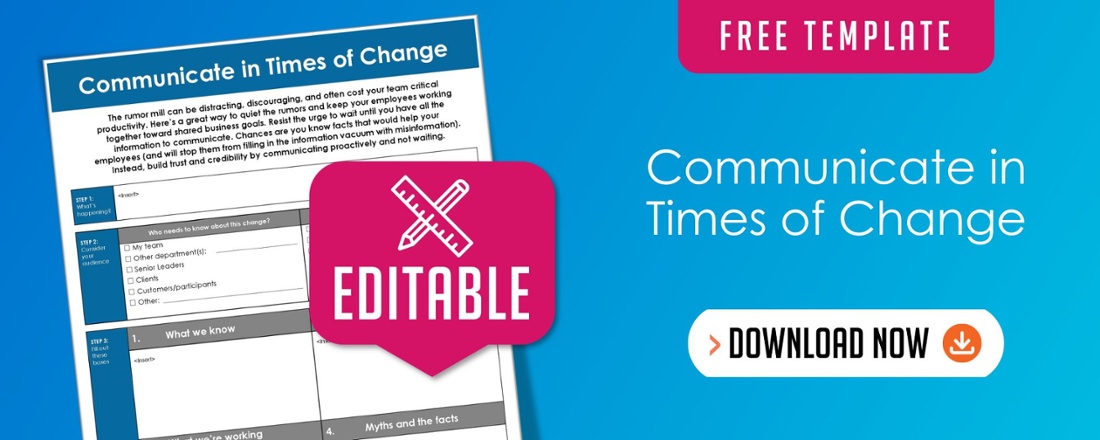Three Distinctive Methods Leaders Can Prioritize Throughout Change
There was a time, just a couple of decades ago, that change inside organizations was more the exception versus the norm. And the cause of that change was less externally driven – there wasn’t the perpetual risk that if you didn’t adapt, for example, to digital disruption, labor demands, or environmental, social, and governance expectations, you’d be left behind.
Beyond the implications this has for organizational ecosystems, it’s also having a profound impact on the people leading these companies. Across all our clients, we’re seeing leaders who are overwhelmed – feeling as though there’s no off-ramp on the hamster wheel of change.
It’s why a recent article I read by former New York Times “Corner Office” columnist, Adam Bryant, really hit home. While he wasn’t writing about change specifically, the following points – not direct quotes – resonated with me and can help leaders of all types navigate change.
3 Tips to Help Leaders Prioritize to Drive Change
Consider these points when navigating change:
- Look in the beautiful mirror: The easiest way to get “unstuck” is to write down where you want to be 2-3 years from now (whether as a business, function, team, or individual) and the big actions (the roadmap) that will advance this journey. While it’s certain to evolve and change – or be dead wrong – contrasting the future “beautiful mirror” with today’s “ugly mirror” will get you and your teams off the treadmill of mediocrity. Doing this also gives people hope. Optimism. A reason to believe.
And – as leaders – writing this down gives you a frame from which to listen, challenge, contrast, and ultimately get the clarity that’s needed to move forward.
- Be comfortable making things uncomfortable: Often, we’re overwhelmed by the forces of change because there are things we – or our people – are walking around with that just need to be put out there in the open. But we’re often afraid to ask – or we ask the wrong questions – that prohibit putting the “moose on the table.” These are the issues that need to be addressed … or they remain barriers to sustainable change.
As a leader, the more vulnerable – or imperfect – you are during these conversations, the more likely people will be honest with what’s on their minds. People need to feel that you have their best interests at heart, not only to share what’s on their minds, but also to want to be part of the solution.
- Identify your “Picasso a day”: The sheer number of responsibilities, projects, and priorities we’re accountable for can be overwhelming, especially when that’s in addition to the external factors facing our companies and the change we’re trying to navigate toward. There are only so many hours in a day.
That’s why the most effective leaders we’ve seen have extreme clarity on the ONE thing that matters most each day – their “Picasso a day.” There are many factors that go into this prioritization: what projects matter most, where do I, as the leader, have the greatest leverage to drive results, and which am I most qualified to have the greatest impact on?
The pressures of change will likely never subside. Tensions between businesses and the external reality will, in fact, grow. The pace we’ve experienced is here to stay. However, these strategies can make this less overwhelming and accelerate the very change necessary for our personal and professional success.
How might applying one of these tips help you lead better through change?
—Jason Greenspan
About Jason
 Jason Greenspan is Senior Vice President at The Grossman Group and combines an extensive communication background with strategy expertise to drive large-scale transformation in big organizations. Across various senior communications, strategy, and leadership advisory positions, his expertise is driving change and inspiring growth during business-critical moments. Prior to joining The Grossman Group, Jason spent 20+ years at the McDonald’s Corporation, working with top leaders – including three CEOs and seven Presidents. Connect with Jason on LinkedIn here.
Jason Greenspan is Senior Vice President at The Grossman Group and combines an extensive communication background with strategy expertise to drive large-scale transformation in big organizations. Across various senior communications, strategy, and leadership advisory positions, his expertise is driving change and inspiring growth during business-critical moments. Prior to joining The Grossman Group, Jason spent 20+ years at the McDonald’s Corporation, working with top leaders – including three CEOs and seven Presidents. Connect with Jason on LinkedIn here.
Help guide your communications through change with this fully editable Word document tool – click the image below to download your free copy today!

